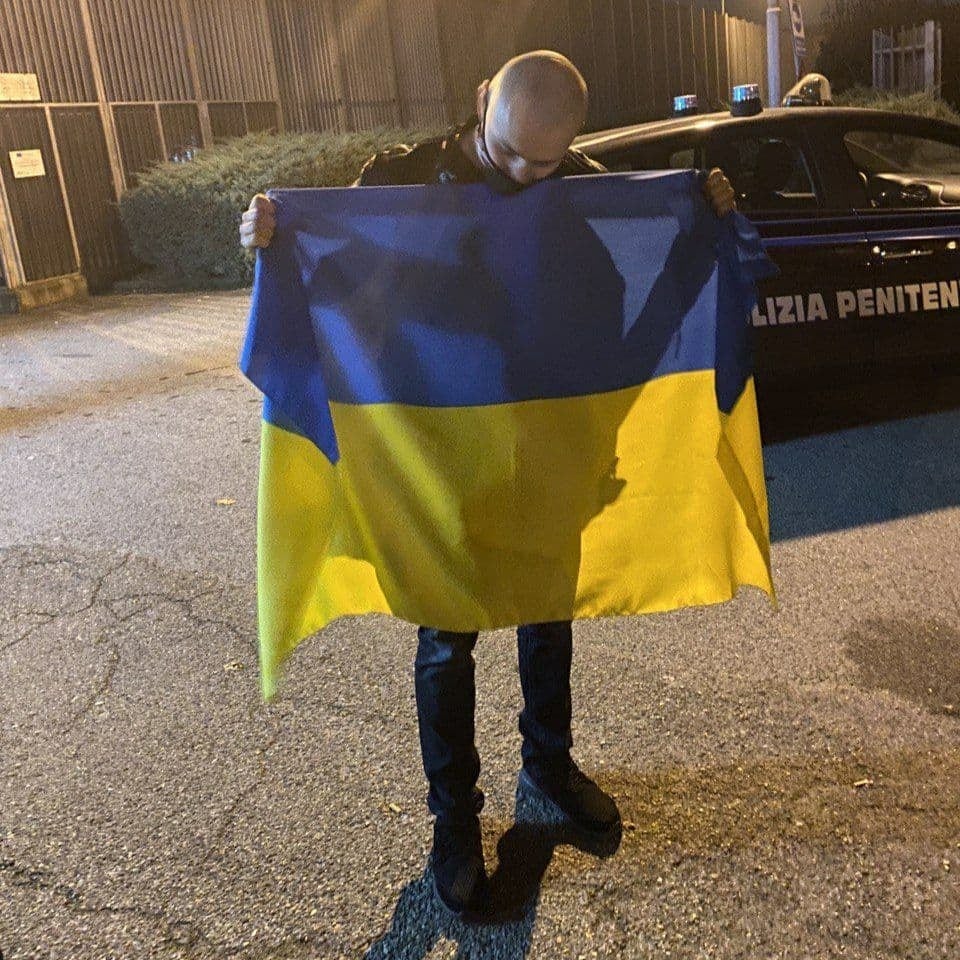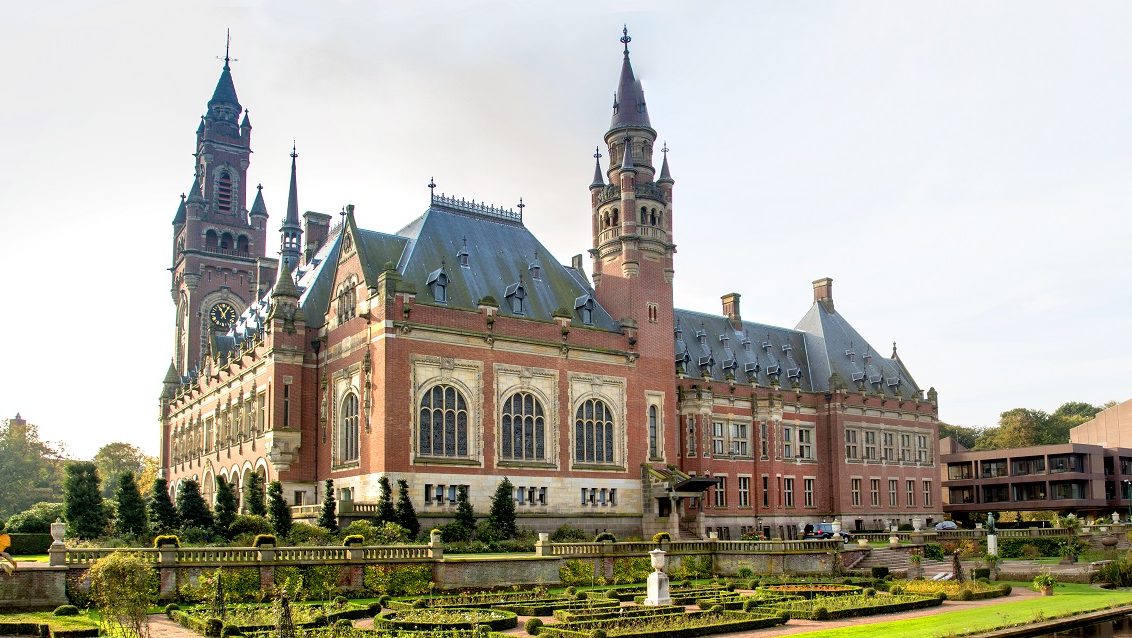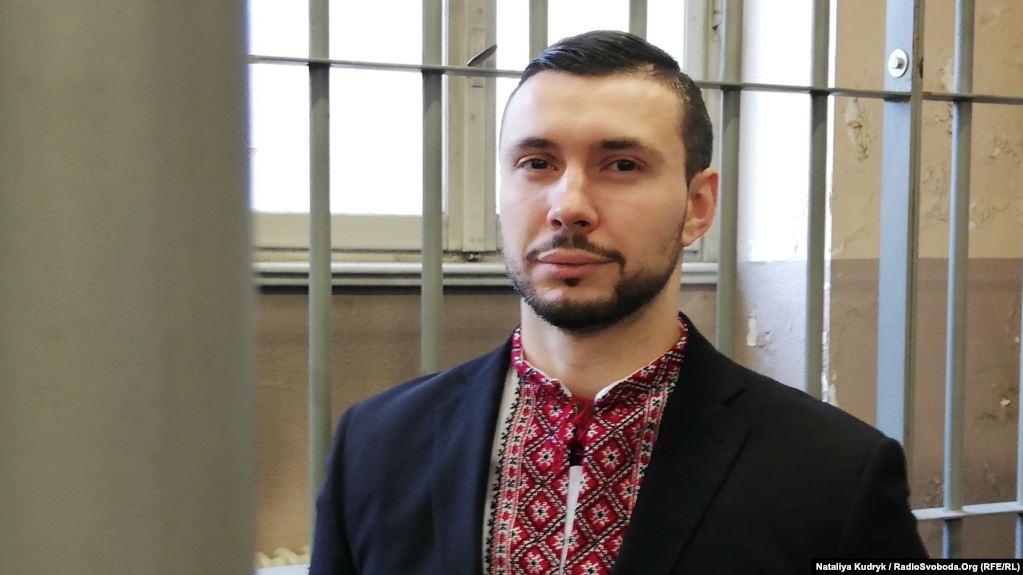The court of first instance of Pavia sentenced Markiv to 24 years in prison for alleged complicity in the killing of Italian photojournalist Andrea Rocchelli and Russian interpreter, journalist and human rights activist Andrei Mironov. Vitaliy Markiv spent three years and four months in an Italian prison.
Vitaliy Markiv leaves Milan prison on November 3, 2020
How can this be? Italy is part of a free and democratic Europe; the country is a long-time member of the European Union, which is fully aware of Russia’s hybrid tactics… So why!? It is only after plowing through 175 pages of the final judicial report by the Pavia Trial Jury (Verdict No.1/2019; No.8065/2016 Notice of offense), kindly provided by Ukrainian journalist Olha Tokariuk, that I fully understood the absurdity of the accusation.

Close exploration of Russia’s insidious propaganda strategy with regard to the justice system in any country has enabled us to understand how and to what extent Russia has invaded international information space. Russia’s strategy is simple and direct. The Kremlin seizes the most controversial cases, inflaming legitimate grievances and manipulating the public’s lack of familiarity with the legal system and due judicial process.
Russia targets democratic judicial systems, successfully spreading disinformation narratives through three primary channels: on social media, such as Facebook, Twitter, YouTube, Instagram, etc., on Russian state-sponsored media outlets, such as Russia Today and Sputnik, and through statements by top Russian officials, including Vladimir Putin himself. The fact that the prosecution in the Markiv trial relied on such open-source platforms was truly outrageous.
On July 12, 2019, Ukrainians and Ukraine-followers were stunned and shocked when Markiv was sentenced to 24 years in prison by the Pavia court. Recovering from this judicial bombshell, Ukrainian activists, journalists and civil leaders mobilized their forces to make this case resonate on a global scale, and particularly in the English-speaking media. An article on the Markiv case finally appeared in the New York Times and the case gained wide resonance throughout Italy and Europe.
Former Minister of Foreign Affairs of Ukraine Pavlo Klimkin is convinced that Russia’s purpose was to set a legal precedent.
“This special operation was planned by Moscow, but fortunately, it failed. It’s obvious that the scenario was written in Moscow. The goal is more than just propaganda. The Kremlin wants to set a precedent. But, this did not happen.”
Deputy Minister of Internal Affairs of Ukraine Anton Herashchenko told journalists that “Using the example of Rocchelli’s death, Russian propaganda did everything possible to demonstrate that Ukrainian soldiers are beasts, ready to kill journalists.”
Finally, as noted by Franco-Italian journalist, politician Olivier Dupuis and Italian journalist Carmelo Palma on Dupuis’ blog and in an article in Kyiv Post on November 2, 2020:
“The entire legal process played into this ideological trap: even allowing as evidence a fake document published on a Russian propaganda website, alleging an organized plot to exonerate Markiv and deceive the Italian judiciary. Not to mention the OSCE report presented as evidence of Ukrainian attacks against journalists, even though the report blames these attacks on pro-Russian separatists.”
Due credit should be given to civil activists and journalists, in Ukraine and abroad who continued to organize flash mobs, rallies and protests in support of the Ukrainian soldier. Kudos to the Ukrainian community in Italy, Ukrainian activists Lesya Tsybak and Oles Horodetskyy, who supplied on-site information and monitored the trials in Pavia and Milan.
Special credit goes to the Ukrainian-Italian film crew of Crossfire, a documentary which explores and highlights the true circumstances that led to the death of the two journalists. Journalists Olga Tokariuk, Cristiano Tinazzi, Ruben Lagattolla and Danilo Elia provide answers to a number of questions that arose during the trial, producing on-site facts and figures, and a crime-scene reconstruction and analysis. It should be noted that some of their reports were taken into consideration during the hearing in the Milan.
Home at last!
Radio Liberty journalist Nataliya Kudryk was able to conduct an interview with Vitaliy Markiv before his departure for Ukraine. Markiv noted that during his time in prison he was expecting the worst, but hoped for the best. He added that despite all the difficulties he remained an optimist, but the outcome was a real miracle. When questioned about Italy, where he spent 13 years of his life, he replied as follows:
“Italy gave me the opportunity to experience “the European spirit”, the possibilities offered by a democratic country. Of course, these three years of imprisonment have shown me the country’s other side. But, I cannot and will not condemn Italy for the actions of certain individuals. That wouldn’t be fair
Italy gave me an education, a roof over my head and showed me what life in Europe was really like.”
Vitaliy added that the three years spent in prison enabled him to read and think a lot about his future. He is willing to share his thoughts with young Ukrainians and offers the following advice:
“The struggle for justice continues as long as you continue fighting. It’s impossible to break a person who continues fighting.
It’s only when you give up, when you lose heart that everything comes to an end; defeat ensues when you stop fighting for your beliefs.
Therefore, I advise the young generation and all people who have dreams, to stop feeling inferior. If you don’t respect yourself, you’ll find it difficult to appreciate someone else.
You should set goals, and never give up, keep them in target!
Of course, there will be obstacles, the path will be difficult; on the way, people will try to discourage you. They’ll say that you’re not important enough, that you can’t change anything, that you’re nothing more than a drop in the ocean.
But, many examples show that unity is strength; it’s like many drops of water pouring down from the mountain, gaining strength and finally breaking through the rocks.”
Vitaliy Markiv arrives in Kyiv, November 4, 2020
When the Ukrainian aircraft landed in Kyiv, Vitaliy Markiv was the first to disembark, wearing the uniform of the National Guard of Ukraine and holding a blue-and-yellow flag in his hands. He was welcomed by his wife Diana, friends, Ukrainian officials and his comrades-in-arms from the Kulchytsky Battalion. Markiv gave a brief speech and answered some questions before being whisked away to meet President Zelenskyy.
“This is an amazing event. We’ve shown the world that truth exists. The sentence that was pronounced by the Pavia court demonstrated that Kremlin propaganda has no limits, but justice exists. This victory is also in memory of all the fallen Defenders of Ukraine.
I’m a soldier. For me, dignity and discipline are of the utmost importance. I followed the example set by General Kulchytsky. I had the honour and privilege of knowing him; he was a general with the heart of a real soldier, a true patriot. We completed our brief military training in the spring of 2014, but we all had a strong fighting, patriotic spirit. We passed it on to our comrades-in-arms. Today, we have proved once again that we can stand up to one of the strongest armies in the world. .
I have nothing against the Italian people. I wasn’t sentenced by the Italian people. Yes, the verdict was pronounced in the name of the Italian people, but if you ask them whether they all agree with the court’s decision … I think most would say they don’t…
Now that I’m finally home, I plan to spend some time with my wife. I haven’t seen her for three years. Today, we met again and embraced for the first time in three long years. When I heard that all the charges were dropped, not only from me, but also from Ukraine, I couldn’t believe my ears! I was preparing for the worst, but I hoped for the best.”

Further appeals?
Ukrainian Human Rights Commissioner Liudmyla Denisova said that the prosecution would probably file a complaint to the Supreme Court of Cassation of Italy.
However, human rights activist and international law expert Yevhen Oharkov considers it unlikely that the verdict will be overturned. The Court of Cassation reviews the case exclusively in the context of procedural law, and will not be able to provide any new evidence. The Milan Court of Appeal accepted the new evidence and considered the decision of the court of first instance in compliance with all procedural requirements.
Two parallel worlds

Ukrainians knew that Vitaliy Markiv was not guilty and looked to the impartiality of the Italian judiciary. The State of Ukraine also participated in the trial and had its own lawyers. Moreover, Ukraine (the Ministry of Interior) conducted its own investigation into Rocchelli’s death, interviewed witnesses, supervised its own expert examinations, and was allowed to present its case in the Italian court.
On the same day, many hundreds of miles away from Milan, a kangaroo court in Rostov, RF convicted three Crimean Tatars for belonging to Hizb ut-Tahrir, a Muslim organization which is legal in Ukraine and in most countries, but labeled as “terrorist” in Russia. The three men rejected the charges, stating that they were Ukrainian citizens and that it was not a crime to read books or study religion. But, Russian courts do not hear the truth, provide no concrete evidence and continue issuing harsh sentences on Crimean Tatars.
Rustem Emiruseinov was sentenced to 17 years, Arsen Abkhairov to 13 years and Eskender Abdulganiev to 12 years.
Two parallel worlds…
Lessons to be learned
All’s well that ends well, but there are several lessons to be learnt from this unexpected victory. As Ukrainians celebrate, they should understand that this legal victory was made possible not only thanks to Markiv’s defence team and public opinion, but also because an independent judicial system actually exists in Europe. Such systems are sorely lacking in Russia and many former Soviet countries.
Therefore, Ukrainians must once again take a look at what is happening in their own backyard, decide what they really want and in which direction they wish to go – towards Europe and a world that acquits the innocent, or back to Russia’s “brotherly embrace”, to a world that persecutes, condemns and kills the innocent.

























